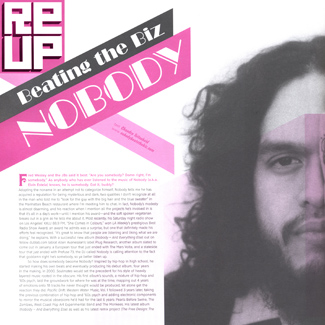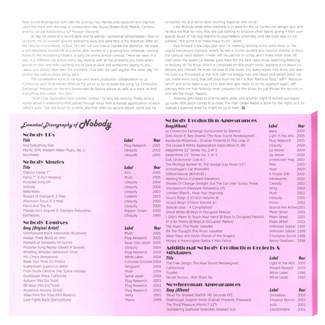

BEATING THE BIZ
Fred Wesley and the JBs said it best: "Are you somebody? Damn right, I'm somebody." As anybody who has ever listened to the music of Nobody (a.k.a. Elvin Estela) knows, he is somebody. Got it, buddy? Adopting the name in an attempt not to categorize himself, Nobody tells me he has acquired a reputation for being mysterious and dark, two qualities I don't recognize at all in the man who told me to "look for the guy with the big hair and the blue sweater" in the Manhattan Beach restaurant where I'm meeting him to chat. In fact, Nobody's modesty is almost disarming, and his reaction when I mention all the projects he's involved in is that it's all in a day's work – until I mention his award – and the soft spoken vegetarian breaks out in a grin as he tells me about it. Most recently, his Saturday night radio show on Los Angeles' KXLU 88.9 FM, "She Comes in Colours," won LA Weekly's prestigious Best Radio Show Award, an award he admits was a surprise, but one that definitely made his efforts feel recognized. "It's great to know that people are listening and liking what we are doing," he explains. With a successful new album (Nobody – And Everything Else) out on fellow dublab.com labrat Allen Avanessian's label Plug Research, another album slated to come out in January, a European tour that just ended with The Mars Volta, and a stateside tour that just ended with Prefuse T3, the DJ called Nobody is calling attention to the fact that goddamn right he's somebody, so ya better listen up.
So how does somebody become Nobody? Inspired by hip-hop in high school, he started making his own beats and eventually producing his debut album, four years in the making, in 2000. Soulmates would set the precedent for his style of heavily layered music rooted in the obscure. His first album's sounds, a mixture of hip-hop and '60s psych, laid the groundwork for where he was at the time, mapping out 4 years of emotions onto 18 tracks he never thought would be produced, let alone get the reaction they did. Pacific Drift Western Water Music, Vol. 1 followed 3 years later, taking the previous combination of hi-hop and '60s psych and adding electronic components to mirror the musical obsessions he'd had for the last 6 years: Pearls Before Swine, The Zombies, West Coast Pop Art Experimental Band and The Monkees. His latest album (Nobody — And Everything Else) as well as his latest remix project (The Free Design: The New Sound Redesigned) both take the previous two themes and expound and improve upon them with the help of collaborators like Peanut Butter Wolf, Madlib, Caribou, and his old pal Xololanxinco (Of Mexican Descent).
By day he works at a record store and he admits – somewhat embarrassed – that on occasion, his co-workers give his anonymity away and send fans in his direction. After all the fans he encountered on tour, he's still not sure how to handle the attention. He leads a self-described double-life in a sense; after months of a grueling tour schedule, coming home to the mundane problems of daily life seems almost comical, "Here we were in a van, in a different city almost every day, dealing with all the problems you have when you're on tour, and then suddenly you're back at work and someone's saying to you, 'Jesus, you should have seen the problems I had with the cash register the other day.' It's almost like culture shock being back."
The conversation turns to his tour and recent production collaboration as La Correccion with Scott Herren (Prefuse 73), which so far includes the song "La Correccion Exchange" featured on Herren's Surrounded by Silence album, as well as a track on And Everything Else called "Tori Oshi."
"Scott's like my brother from another mother," he tells me, smiling. Pretty serious words about a relationship that started through email from a mutual appreciation of each other's work. "We lost touch for a while, and then after my second album came out, he contact me and we've been working together ever since."
I ask Nobody what other madness is in store for the La Correccion danger duo, and he tells me that for now, they are just looking to produce other talent, giving it their own special touch of hip-hop/electronic/psychedelic loveliness. And like Scott says on his website, "the point is to make dope music." Word.
Fast forward a few days later and I'm meeting Nobody at his radio show on the Loyola Marymount Campus, where he was a former student and musical director of KXLU, the campus radio station. I meet Jeff, his partner in crime, and I make them show off their prize, the award LA Weekly gave them for the best radio show. Watching/listening to Nobody do his show, which is comprised of '60s psych music, explains a lot about his albums and himself; he mixes his love of the music into every album he's done, and even his look is a throwback to the '60s, which his shaggy hair and beard and belled jeans. He can name every song that Jeff plays from his life ("Is that 'Rainbow Folly,' Jeff?") Rainbow jokingly tells me that Nobody never prepares for the show – he just throws the records on and lets the magic happen.
Nobody gets ready to end his radio show and another night of stone-out happy-go-lucky '60s psych comes to a close. The man called Nobody is done for the night, and it's nobody's business what he might be up to next…
CHANDRA TEITSCHEID